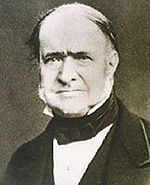Elie de Beaumont
| Léonce Élie de Beaumont | |
|---|---|

Léonce Élie de Beaumont
|
|
| Born | 25 September 1798 Canon, Calvados |
| Died |
21 September 1874 (aged 75) Canon, Calvados |
| Nationality | French |
| Fields | geology |
| Alma mater | École des mines |
| Notable awards | Wollaston Medal (1843) |
Jean-Baptiste Armand Louis Léonce Élie de Beaumont (25 September 1798 – 21 September 1874) was a French geologist.
Élie de Beaumont was born at Canon, in Calvados. He was educated at the Lycee Henri IV where he took the first prize in mathematics and physics; at the École polytechnique, where he stood first at the exit examination in 1819; and at the École des mines (1819–1822), where he began to show a decided preference for the science with which his name is associated. In 1823 he was selected along with Dufrénoy by Brochant de Villiers, the professor of geology in the École des Mines, to accompany him on a scientific tour to England and Scotland, in order to inspect the mining and metallurgical establishments of the country, and to study the principles on which George Bellas Greenough's geological map of England (1820) had been prepared, with a view to the construction of a similar map of France.
In 1835 he was appointed professor of geology at the École des Mines, in succession to Brochant de Villiers, whose assistant he had been in the duties of the chair since 1827. He held the office of engineer-in-chief of mines in France from 1833 until 1847, when he was appointed inspector-general; and in 1861 he became vice-president of the Conseil-General des Mines and a grand officer of the Legion of Honour. His growing scientific reputation secured his election to the membership of the Academy of Berlin, of the French Academy of Sciences, of the Royal Society of Edinburgh (1845), of the Royal Society of London and as a foreign member of the Royal Swedish Academy of Sciences (1848). By a decree of the president he was made a senator of France in 1852, and on the death of François Arago in 1853 he was chosen perpetual secretary of the Academy of Sciences.
...
Wikipedia
